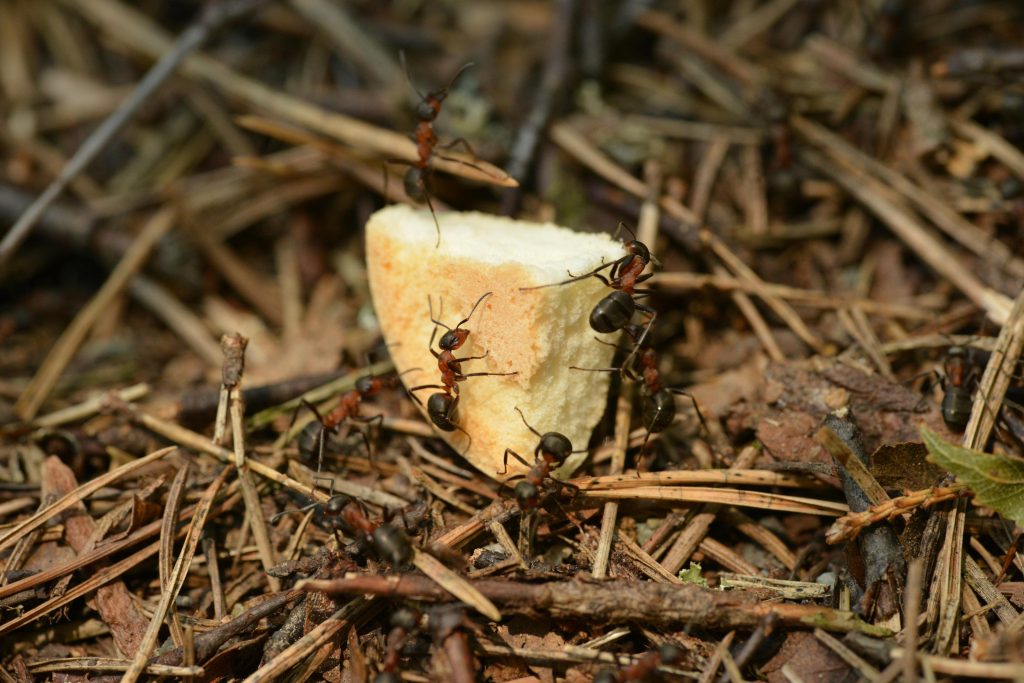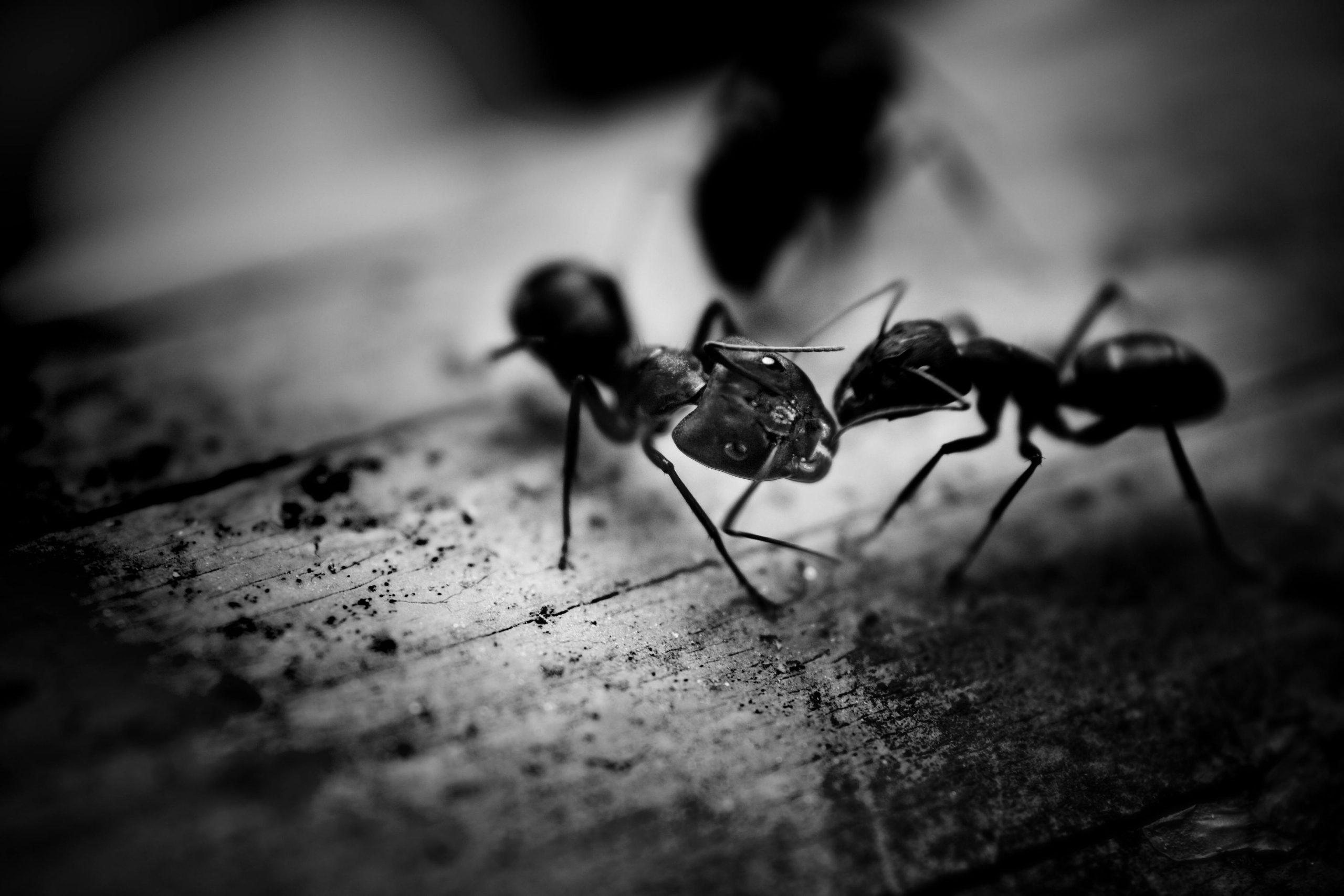If you’ve noticed big black ants in your house, you’re likely dealing with carpenter ants. Unlike small nuisance ants, these larger ants can cause structural damage if left unchecked. In this article, we’ll explore the causes of a carpenter ant infestation, how to prevent them from entering your home, and the most effective methods to eliminate them.
What Are Carpenter Ants?
Carpenter ants are one of the largest ant species, ranging in size from ¼ to ½ inch in length. They are typically black but may also have red or brown markings. Unlike termites, carpenter ants do not eat wood. Instead, they burrow into damp or decaying wood to create nests, which can eventually compromise the structure of your home if the infestation is severe.
Signs of a Carpenter Ant Infestation
Identifying an infestation early is crucial to preventing serious damage to your home. Here are common signs that carpenter ants may be living in your home:
- Presence of Big Black Ants: Seeing large black ants, especially near windows, doors, or damp areas, is the most obvious sign.
- Frass (Wood Shavings): Carpenter ants don’t eat wood, but they tunnel through it, leaving behind small piles of wood shavings, also known as frass.
- Hollow Sounds in Wood: Tap on wooden surfaces, and if it sounds hollow or feels soft, it could indicate carpenter ant activity.
- Rustling Sounds: Sometimes, you can hear a faint rustling noise in the walls or ceilings where carpenter ants are tunneling.
Causes of Big Black Ants in the House

Carpenter ants are typically attracted to moisture-damaged wood. Understanding the conditions that lead to an infestation can help you prevent these ants from entering your home.
Common Causes:
- Moisture Problems: Leaky pipes, windows, or roofs can create damp environments that attract carpenter ants.
- Decaying Wood: Ants are drawn to soft, decayed wood, such as old window frames, doorways, or wood piles near the house.
- Food Sources: Carpenter ants will also search for food indoors, especially sweet substances or proteins like pet food.
How to Prevent Carpenter Ants from Entering Your Home
The best way to deal with carpenter ants is to prevent them from getting inside in the first place. These preventive measures can help keep your home ant-free.
1. Eliminate Moisture
- Fix any leaky pipes, roofs, or gutters.
- Ensure good ventilation in areas like bathrooms, basements, and attics to reduce moisture buildup.
- Use a dehumidifier if necessary to keep the air dry.
2. Seal Entry Points
- Inspect the exterior of your home for cracks or gaps, especially around windows, doors, and utility lines. Use caulk or weatherstripping to seal any openings.
- Trim tree branches and shrubs that are in contact with the exterior of your home, as ants can use these as bridges.
3. Properly Store Food
- Store food in airtight containers to avoid attracting ants.
- Clean up crumbs and spills immediately, and keep counters, floors, and pet food areas clean.
4. Move Wood Away from the House
- If you have firewood, mulch, or other wood materials, store them at least 20 feet away from your home and elevate them off the ground to prevent moisture buildup.
- Remove any decaying wood, such as old stumps or construction materials, from your yard.
How to Get Rid of Big Black Ants in Your House
If carpenter ants have already made their way into your home, there are several methods for eliminating them. Below are the most effective ways to remove carpenter ants.
1. Find and Eliminate the Nest
Carpenter ants will have a primary nest (usually outdoors) and satellite nests inside your home. Locating these nests is the key to getting rid of the ants for good.
- Inspect Damp Areas: Check moist, decaying wood areas like behind sinks, in basements, or in wall voids for frass or other signs of nesting.
- Follow Ant Trails: Carpenter ants usually form trails that lead to food or moisture sources. You can follow these trails back to the nest.
2. Use Ant Baits
Ant baits are one of the most effective methods for eliminating carpenter ants. The ants take the bait back to the colony, spreading the poison and eventually killing the entire nest.
- Sweet-Based Baits: Carpenter ants are often attracted to sugary substances, so opt for sweet-based baits.
- Protein-Based Baits: Protein-based baits may also work if the ants are not going for sugary baits.
- Place Baits Strategically: Put baits in areas where you’ve seen ants, such as along trails, near entry points, or around moisture-prone areas.
3. Spray Insecticides
Insecticides can be used to kill ants on contact or to treat areas where they may enter the home. Be sure to read and follow all instructions for safe use.
- Non-Repellent Insecticides: These sprays are effective because ants don’t detect them and will carry the poison back to the nest.
- Use Outdoor Treatments: Treat the perimeter of your home with insecticides to prevent ants from entering.
4. Hire Professional Pest Control
If the infestation is severe or you are unable to locate the nest, it may be time to call in a professional exterminator. A pest control expert can locate and eliminate the carpenter ant colony and treat your home to prevent future infestations.
Long-Term Prevention Tips
Once you’ve eliminated the carpenter ants, it’s essential to take steps to prevent them from returning. Consider these long-term prevention tips:
- Continue to Address Moisture Issues: Regularly inspect your home for any new moisture problems, especially in high-risk areas like basements and kitchens.
- Maintain the Exterior of Your Home: Ensure that windows, doors, and the foundation are sealed to prevent ants from finding new entry points.
- Regular Pest Inspections: Schedule regular inspections with a pest control service to monitor for any signs of carpenter ant activity.
Conclusion
Big black ants, or carpenter ants, can be more than just a nuisance—they can cause significant damage to your home if left unchecked. By understanding the signs of an infestation, eliminating entry points, and addressing moisture issues, you can keep carpenter ants at bay. If you’re already dealing with an infestation, using ant baits, insecticides, or professional pest control can effectively rid your home of these unwelcome pests.
